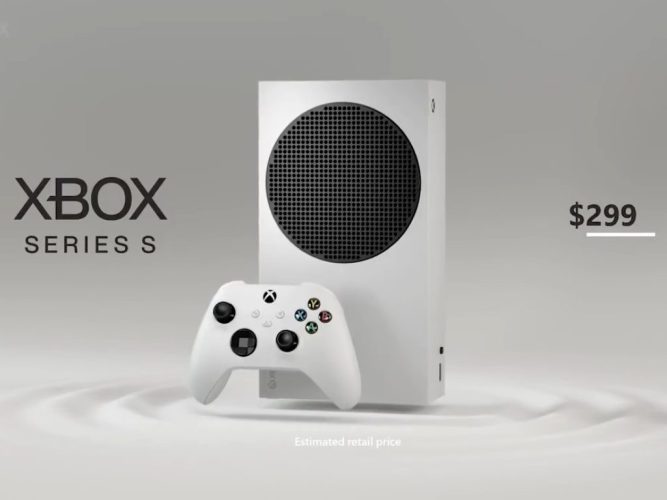Here’s what we know (and what we still don’t) about the Xbox Series S
4 min. read
Published on
Read our disclosure page to find out how can you help Windows Report sustain the editorial team Read more

After images and pricing details for the Xbox Series S leaked earlier today, Microsoft had no choice but to officially announce the console, along with its $299 pricing. The tweet emphasized that the Xbox Series S would deliver “next-gen performance in the smallest Xbox ever,” and the console will indeed be smaller than both the Xbox Series X and the Xbox One X, which was already the smallest Xbox ever.
The prolific Microsoft leaker WalkingCat has leaked an official video trailer for the Xbox Series S, which includes a bit more details about its specs. First of all, the body will be nearly 60% smaller than the Xbox Series X, and Microsoft definitely deserves credit for fitting next-gen components in such a small form factor.
no point holding this back now I guess pic.twitter.com/SgOAjm3BuP
— WalkingCat (@_h0x0d_) September 8, 2020
This leaked trailer also reveals that the Xbox Series S is targeting 1440p gaming at up to 120FPS, and 4K upscaling will be supported for games. The old Xbox One S from 2016 was the first Xbox console that could upscale games to 4K, so it’s not surprising to see that the Xbox Series S will be able to do the same. To be clear, even though the console won’t run games in native 4K like the Xbox One X can, the Xbox Series S will support 4K TVs and upscaled games should look very good on it.
Microsoft has yet to specify if the Xbox Series S will support DirectML, a next-gen component of DirectX that the company previously detailed for the Xbox Series X, though it would make sense to use it to improve the console’s upscaling technology. Just like Nvidia’s Deep Learning Super Sampling (DLSS) technology on PC, DirectML will use machine learning to upscale images in 4K. This is a big deal for developers who will be able to target sub-4K resolutions while focusing GPU power on other things such as ray tracing, and the use of machine learning to reconstruct a 4K image should greatly improve visual quality.
The Redmond giant also confirmed that the Xbox Series S will support DirectX Ray Tracing and Variable Rate Shading (VRS), two next-gen features that should make a real difference in games. DirectX Raytracing will allow developers to improve lighting, shadows, reflections, acoustics, and spatial audio, while VRS will increase GPU efficiency by concentrating shader work where it’s most needed. Microsoft has yet to share more details about the Xbox Series S’ GPU, but previous reports mentioned a custom AMD RDNA2-based GPU delivering 4 teraflops of computing power. In comparison, The Xbox Series X will have an RDNA2-based 12 teraflops GPU that will support 4K/60FPS, 120FPS, as well as 8K gaming.
On the storage front, the Xbox Series S will come with a custom 512GB NVMe SSD that supports Microsoft’s new Xbox Velocity Architecture. 512GB sounds a bit low for an all-digital console, though including 1TB of storage like on the Xbox Series X would probably have raised the $299 price. We have yet to see pictures of the Xbox Series S’ back ports, and we don’t know yet if the Xbox Series S will support the same proprietary 1TB expansion cards made by Seagate. However, this seems almost guaranteed: Speaking about the Xbox Series X, Microsoft previously explained that next-gen Xbox games could only be installed on the internal NVMe storage or on these external cards from Seagate, and the 512GB SSD on the Xbox Series S should be filled up pretty quickly. Gamers will also be able to use regular external hard drives and SSDs to install Xbox One games, but next-gen games will require faster NVMe storage.
???? Let’s make it official!
Xbox Series S | Next-gen performance in the ˢᵐᵃˡˡᵉˢᵗ Xbox ever. $299 (ERP).
Looking forward to sharing more! Soon. Promise. pic.twitter.com/8wIEpLPVEq
— Xbox (@Xbox) September 8, 2020
We hope that Microsoft will soon share the full details about the Xbox Series S specs, but so far this cheaper next-gen console seems to deliver great value for $299. It should be a great offering for gamers interested in Xbox Game Pass, or those who only play a couple of games such as Fortnite or FIFA and don’t want to spend $500 on a new console. Microsoft only confirmed a November release date for the Xbox Series S, but Windows Central revealed earlier today that both the Xbox Series S and the Xbox Series X would launch on November 10. With Xbox All Access, Microsoft will reportedly offer the Xbox Series S for as little as $25/month for 24 months, while the $499 Xbox Series X will be available for $35/month. If true, it remains to be seen how Sony will price its PlayStation 5, which will also have a cheaper discless version.









